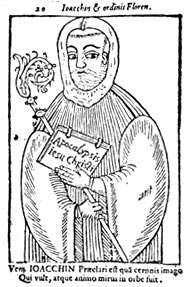Joachimites
The Joachimites, also known as Joachites, a millenarian group, arose from the Franciscans in the thirteenth century. They based their ideas on the prior works of Joachim of Fiore (c. 1135 – 1202), though rejecting the Church of their day more strongly than he had.
Inspiration of Joachim
Joachim's works divide history into three ages. The first age was of the Father. The age of the Father was the age of the Old Covenant. The second age was of the Son and therefore the world of Christianity. The third and final age would be that of the Holy Spirit. In this new age an "Eternal Gospel" would be revealed "fulfilling" and replacing the organized church. After that society would be realigned on an egalitarian and utopian monastic base. The first age is said to have been of forty-two generations. The second age would also be of 42 generations. Joachim seemed to suggest the Christian era would end in 1260 with the coming of the Anti-Christ. After that a utopian age would arrive.
Initially this did not cause condemnation; efforts recently have even been made toward his canonization, as what was meant was disputed. Several interpreters view his utopian age literally as heaven or, at least, as the age after the Second Coming since it comes after the Anti-Christ and the Tribulation. Consequently, to state that the Church would then be unnecessary might be acceptable.
Controversy
In 1215 some of his ideas were condemned in the Fourth Council of the Lateran. Further, his admirers came to believe the beginning of this New Age would be ushered in by the coming of a virtuous Pope from the Franciscan order. They considered Celestine V to be this Pope. His resignation, and death in 1296 in the dungeons of the next Pope, was considered a sign of the coming of the Anti-Christ. Around this time, or somewhat before, they further decided Joachim's own writings were the Eternal Gospel or the road to it.
The fact that the movement also moved toward a more practical approach did have some influence. It was one of the first movements to be heavily geared toward the future as being made perfectible through human action. This action was largely to lead toward a great supernatural event, but had a great deal of real world notions of progress. Ultimately, however, this was also generally opposed, as utopian revelations were deemed to be foolishness or even heresy.
Influences
The Joachimites believed this new age would be egalitarian and essentially monastic. Later offshoots of Joachimite thought went a good deal further. The Brethren of the Free Spirit or the Ranters are often believed to have accepted elements of Joachimite concepts. The Brethren of the Free Spirit's view of history has a noticeable resemblance. However they declared a new age to have already occurred, or was occurring, whereas the Joachimites tended to place it in a future after the Catholic Church had withered away. English confusion of the Beghards with the practices of "Free Spirit"-type groups is sometimes said to have been the origin of the old British legal term "bugger."
Another sect inspired by Joachim's theories were the Dulciniasts.
The Franciscan Joachimites, along with members of the Knights Templar, inspired in Portugal, in the late 12th century and early 13th century, the creation of the cult of Empire the Holy Spirit.
Other historians indicate parallels between the Joachimites and later millenarian forms of Christianity. It is fairly common for millenarian or messianic Christian movements to view themselves as leading into a new age of the Holy Spirit. Groups as diverse as the Shakers, Mita Congregation, and the Holy Spirit Movement have all believed that a new age of the Holy Spirit was in some sense dawning. Others relate Joachimite ideas to any group that believes in the "New Age".
There are less direct ideological linkages to the Protestant Reformation and less historically confirmed ones to Marxism. The Joachimites, and not Joachim himself, were condemned by the Catholic Church after Celestine V. Other rhetoric they used would be mirrored by a few of the early leaders of the Reformation. However, the Joachimites' idea of having a new revelation which superseded Christianity would not be adopted by any significant figure in the Reformation. Their idea that the hierarchical, authoritarian structure of the Church would collapse, to lead toward a leaderless egalitarian communal state is seen by some as an indirect influence, or at least a precursor, to Marx's idea of a perfect communist democracy arising from the dictatorship of the proletariat.
References
- Lerner, R. E. (2000). The Feast of Saint Abraham: Medieval Millenarians and the Jews. Philadelphia: University of Pennsylvania Press. ISBN 0-8122-3567-3.
- McGinn, Bernard (1985). The Calabrian Abbot: Joachim of Fiore in the History of Western Thought. New York: MacMillan. ISBN 0-02-919550-0.
- Reeves, Marjorie (1993). The Influence of Prophecy in the Later Middle Ages: A Study in Joachimism. Notre Dame, IN: University of Notre Dame Press. ISBN 0-268-01170-2.
External links
| Wikiquote has quotations related to: Joachimites |
- Apocalypticism article at the Wayback Machine (archived March 16, 2004)
- Joachimites
- PBS article
- Scholarly essay by Toby Affleck at the Wayback Machine (archived October 21, 2000)
